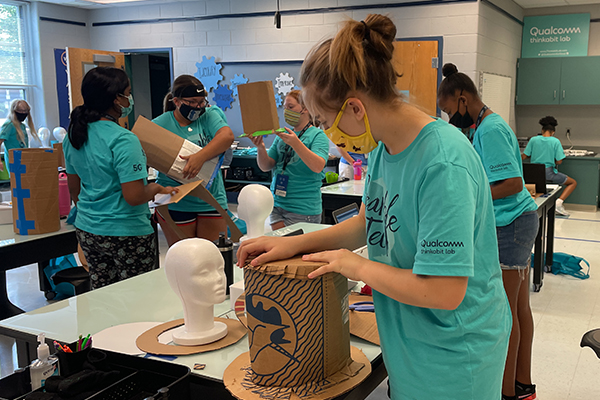 Cedar
Point
Elementary
School
recently
hosted
15
Marsteller
Middle
School
students
for
a
Tech
Camp,
sponsored
by
Qualcomm,
a
leading
organization
in
the
technology
industry.
During
the
week-long
camp,
students
explored
their
strengths,
interests,
and
values.
Cedar
Point
Elementary
School
recently
hosted
15
Marsteller
Middle
School
students
for
a
Tech
Camp,
sponsored
by
Qualcomm,
a
leading
organization
in
the
technology
industry.
During
the
week-long
camp,
students
explored
their
strengths,
interests,
and
values.Students programmed positional and continuous servomotors. A positional servomotor can be programmed to rotate to any angle between 0 and 180 degrees, and a continuous servomotor can be programmed to spin continuously clockwise or counterclockwise.
In addition, students decorated hats designed and constructed out of cardboard, encouraging students to be creative by using recycled materials. Students then used the coding skills gained to program their servomotors, to build and design an automated hat, using light-emitting diodes (LED)s.
Eighth grader, Emlyn Monti, shared, "Horses are a big part of my life, so I'm going to glue a small horse [figurine] to a continuous servomotor so that it spins in pirouette, which is a dressage move."
Sixth grade student, Gianna Rodriguez, said, "I liked that we learned about coding because I want to join Robotics [club], and this will help me be prepared for when I join." Rodriguez highlighted a part of the code sequence on her laptop screen stating, "Here it says void loop, so the motor knows to spin 180 degrees forever." Rodriguez was using code to program her servomotor to spin continuously so that she could adhere a circular cardboard piece to it with facts about herself and have the top of her hat spin.
Students practiced their critical-thinking skills to find ways to solve problems. "My favorite part of Tech Camp has been the challenges and thinking about what we can do better or simpler. One of the challenges we had to face was calculating weights and see if the items we wanted to put on our hats would be too heavy for the servo motors to spin," shared eighth grader, Madlyn Christian.
Adair Solomon, innovative technology teacher at Cedar Point, said, "Tech week is engaging-rich in fun and learning. The girls explore the technical and creative aspects of circuitry, coding, and engineering. More importantly, they learn about themselves. By exploring their individual strengths, interests, and values, they are empowered as they discover that there are endless opportunities available to them as inventors of the future."
